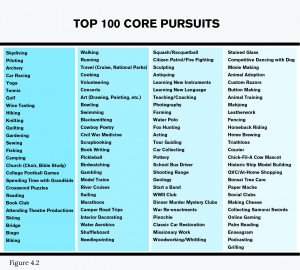Congratulations, you’re retired!! All your hard work, savings, and financial planning have gotten you to this point, and now it’s time to kick back and relax, right? I’d give that thought a solid “maybe!”
The truth is there’s more to retirement than being financially secure. While some people believe working was the hard part, you have to know what you want to do during your retirement years before you can enjoy doing it. While we believe that it’s important for everyone to have hobbies in retirement, it truly is extra important if you are entering retirement alone.
Unfortunately, there are many people who have lost a loved one due to sickness or divorce. These people may be facing retirement with excitement but also with a bit of skepticism because work may have been their social lynchpin.
Whether you are facing retirement alone or with a partner, core pursuits are an integral part of being a happy retiree.
The Need for Core Pursuits (a.k.a. Hobbies on Steroids)
In Wes Moss’s recent book, “What the Happiest Retirees Know,” he suggests developing 3.6 core pursuits or more. Core pursuits are the building blocks for happiness during your post-career years. They’re like hobbies, but BIGGER. And the key is to figure them out even before your retirement years so that you can hit the ground running.
Core pursuits come in many shapes and sizes. Research for the book found that there is a myriad of core pursuits for happy retirees. Among the top core pursuits are travel, activities with family and grandkids and playing golf or tennis. But the number one core pursuit of happy retirees is volunteering.
Retirees who volunteer report much higher self-rated health than those who don’t. Not sure how to volunteer or where to start? Here are some thoughts:
- Tap your professional skills. You’ve spent the last 20, 30, 40 years honing your expertise in a certain field or industry. Why not take those same skills and put them to use in a not-for-profit way?
- Use your trade skills. Are you a carpenter? An electrician? A landscaper? Offer your time or services at a charity auction or community fundraiser, or simply pitch in when a friend or neighbor needs help.
- Let your creative energy flow. If you‘re a musician, start a volunteer band that plays for USO tours. If you’re an artist, share your artwork at the local hospital. If you’re a performer, put on a new play. Lend your voice and your talent to causes you care about.
- Become a member of a board. Board members have a powerful opportunity to impact an organization by becoming deeply invested in what happens behind the scenes.
- Help people with their taxes. Ben Franklin said it best: nothing is certain except death and taxes. You can’t always help people with the first, so why not try the second?
- Get your hands dirty. Clean up a highway. Plant some trees. Beautify your neighborhood in places the city won’t. Better yet, build a house for a family that needs it. Habitat For Humanity is a great organization that has many opportunities in many areas across the country.
- Tutor someone. Are you good at algebra? English? Photoshop? Maybe there’s a kid nearby who could use your help.
- Help a senior. Ask the senior citizens in your life how you can best assist them. That might mean weed-whacking their hedges or shopping for groceries if they’re homebound.
- Spend time with animals. If you can foster a rescue dog or cat, fantastic. If you can’t, offer your time and energy instead.
- Do our own thing. Maybe it’s social entrepreneurship. Maybe it’s doing something no one has thought of yet. If you see a volunteer need that’s not being met, fill it.
Pickle What?
I would be remiss if I didn’t mention the craze that’s taking the sporting world by storm. A combination of ping pong and tennis, pickleball is a fun, physically active sport that’s played with a wiffle ball and a paddle. In the vein of “inquiring minds want to know,” I did a little digging to find out the origins of this peculiarly named sport. According to the USA Pickleball Association, here’s a little rundown on the history:
2022 marks the 57th anniversary of pickleball, as it was invented in 1965 on Bainbridge Island, a short ferry ride from Seattle, by three enterprising dads- Joel Pritchard, Bill Bell, and Barney McCallum. Their children were bored with the usual summertime activities. It evolved from the original handmade equipment and simple rules into a popular sport throughout North America and is now taking off in other parts of the world.
The origin of the game’s name is very interesting, especially since no pickles are used. Accounts of how the name originated differ. According to Joel Pritchard’s wife (Joan), she started calling the game pickleball because, “The combination of different sports reminded me of the pickle boat in crew where oarsmen were chosen from the leftovers of other boats.” However, according to Barney McCallum, the game was officially named after the Pritchards’ dog Pickles who would chase the ball and run off with it. According to McCallum, “The Pritchards had a dog names Pickles, and you’re having fun at a party, right? So anyways, what the hell, let’s just call it pickleball.”
Others claim both accounts may be true. In the early years, no official name was assigned to the game. However, a year or two after the game was invented, the Pritchard’s’ purchased a cocker spaniel and named it Pickles. As the game progressed, an official name was needed and “pickleball” was it.
Pickleball grew in 2021 to 4.8 million players in the US, according to the 2022 Sports & fitness Industry Association (SFIA) Single Sport Report on Pickleball.
*Source: USA Pickleball Association
I can tell you personally that I love the sport and have found myself spending as many hours a week on the pickleball court as possible!
Next Steps
If you don’t have any core pursuits at this time, don’t despair. There are so many opportunities out there. See the chart below for the Top 100 Core Pursuits. I bet there’s at least a couple on the list that will suit you perfectly!

The opportunities are endless. Get out there and find your core pursuits. And if you still need help, take our Core Pursuit Finder! Hopefully, this will point you in the right direction.













